
ASU prepares Vietnamese university for global readiness
The Industrial University of Ho Chi Minh City earned ABET accreditation for six degree programs after receiving extensive training facilitated by the Ira A. Fulton Schools of Engineering at ASU
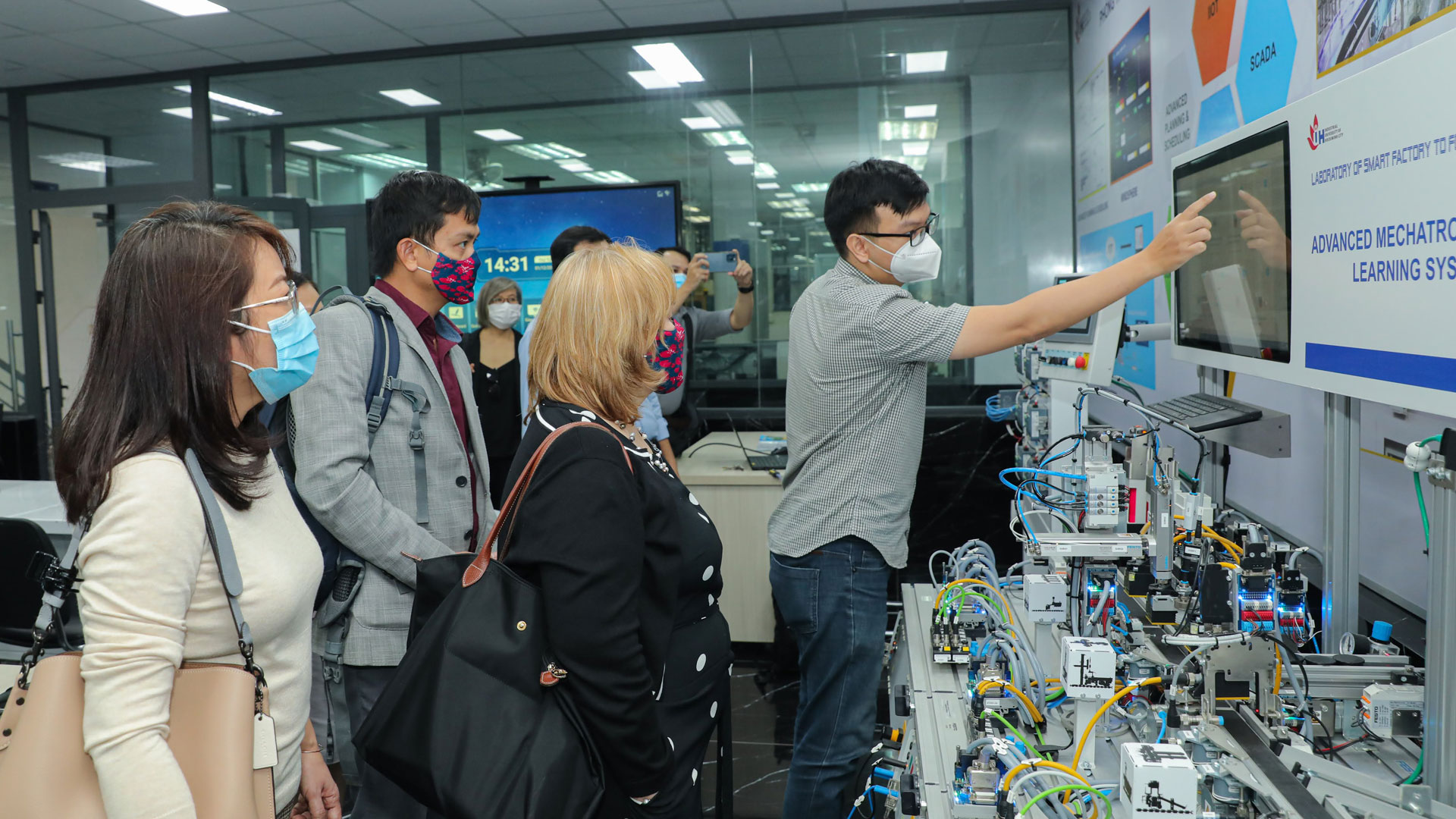
Quality education is essential for individuals, institutions and industry to succeed. Universities value industry input to help train engineering students for roles after graduation, and technology companies need workers whose degrees have prepared them to take on 21st-century challenges.
The Accreditation Board for Engineering and Technology, or ABET, ensures that science, engineering, computing and technology associate’s, bachelor’s and master’s degree programs around the world meet quality standards and prepare graduates for their professional careers.
While ABET accreditation is all but required for U.S. universities to be competitive, it is a new priority in Vietnam, where the Ira A. Fulton Schools of Engineering at Arizona State University has extensive educational collaborations through the U.S. Agency for International Development-sponsored Building University-Industry Learning and Development through Innovation and Technology, or BUILD-IT, program.
“Our work through the USAID BUILD-IT project has helped our academic, industry and government partners advance social and economic development in Vietnam through collective leadership and investment in building regionally and internationally recognized STEM programs,” says Jeffrey Goss, associate vice provost for Southeast Asia, executive director for the Office of Global Outreach and Extended Education, or GOEE, and an assistant dean of the Fulton Schools at ASU. “We are proud to see our peer institutions in Vietnam create innovative engineering and technology degree programs that set the region’s students up for success in today’s ‘Industry 4.0’ driven global industry.”
After in-depth preparations facilitated by the Fulton Schools GOEE team, the Industrial University of Ho Chi Minh City has earned ABET accreditation for six bachelor’s degree programs: information systems, information technology, biotechnology, food engineering technology, mechanical engineering technology and manufacturing engineering technology.
Out of more than 150 universities in Vietnam with engineering and technology degree programs, only four have achieved ABET accreditation so far. The Industrial University of Ho Chi Minh City, known as IUH, has the most programs accredited as of 2022 and was the fifth institution to gain ABET program accreditation after Ho Chi Minh City University of Technology, Cao Thang Technical College, International University – Vietnam National University, Ho Chi Minh City and Duy Tan University. IUH is now preparing five additional programs for ABET accreditation.
The number of Vietnamese universities with ABET-accredited programs could start growing more quickly due to the resources the Fulton Schools’ GOEE team has helped put in place in the region.
Kathy Wigal, director of global operations for GOEE in the Fulton Schools and project director of BUILD-IT, says engaging globally is part of ASU’s responsibility as outlined in its charter; collaborative projects like BUILD-IT are an important component of the university’s work.
“Not only are we helping [Vietnamese] universities get their accreditation, which builds quality engineers and improves the profession and STEM in general,” Wigal says, “we are creating a sustainable pipeline of assessment and accreditation in the region.”
Achieving high standards with ABET
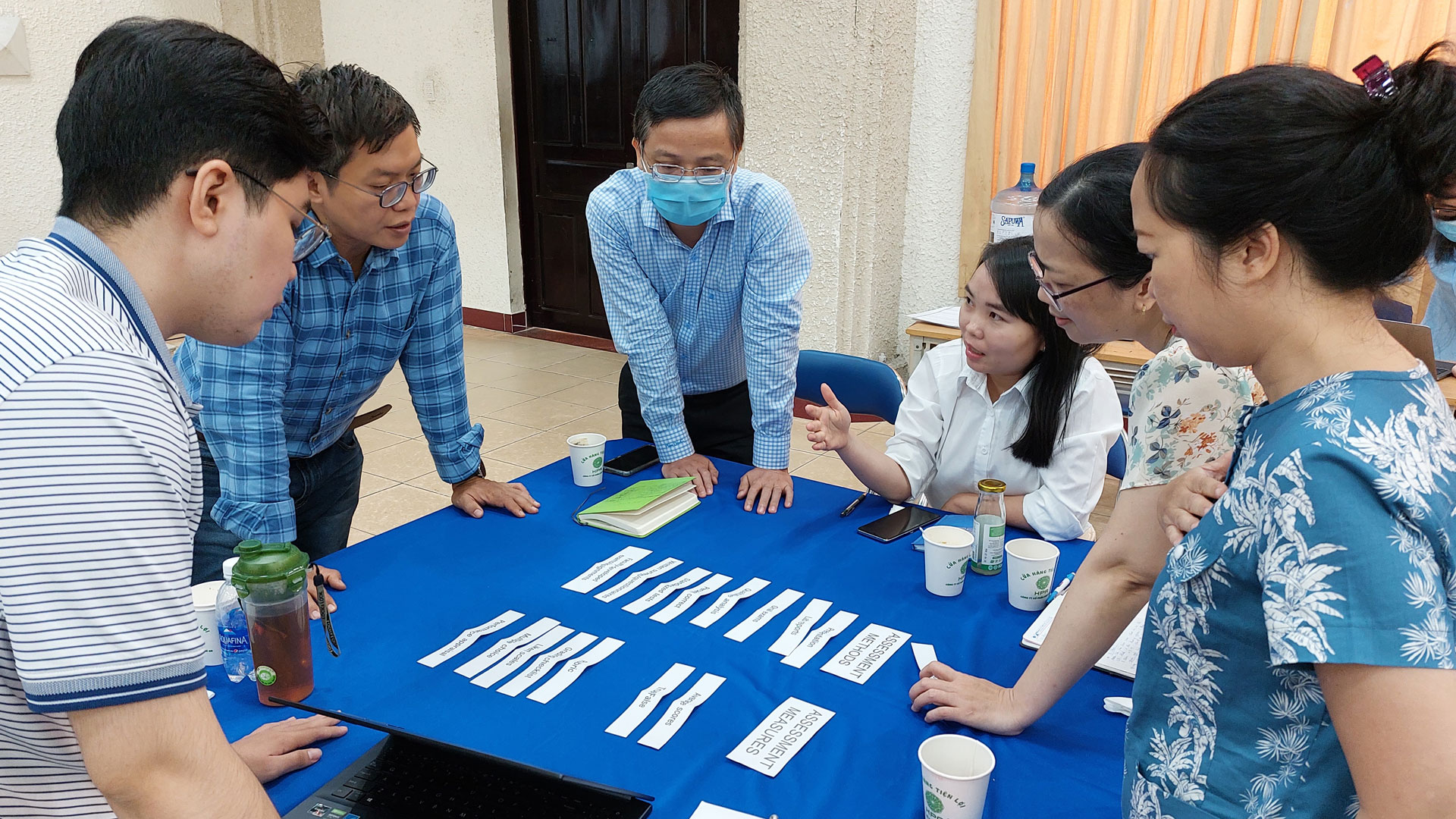
Vietnamese university leaders, faculty and quality assurance professionals participate in an ABET accreditation activity during a BUILD-IT workshop. A variety of sessions designed by the Fulton Schools GOEE team help university teams prepare their programs to meet ABET’s quality standards. Photo courtesy of BUILD-IT
ABET accreditation is achieved through an extensive peer-review process by members of industry, academia and government. No matter which country they’re located in, all university programs go through the same accreditation process to qualitatively and quantitatively assess how they prepare graduates for their expected careers based on defined standards.
For bachelor’s degree engineering programs, ABET evaluates eight criteria: students, program educational objectives, student outcomes, continuous improvement, curriculum, faculty, facilities and institutional support. ABET sometimes requires additional criteria for specific programs depending on the discipline.
Overall, the assessment for these criteria ensures appropriate expectations, documentation and procedures for student performance and learning objectives such as problem-solving and critical-thinking skills, technical and analytical skills, communication and teamwork skills, and awareness of ethical and professional responsibilities.
Each university must have in place an effective program curriculum with minimum credit requirements and design experiences as well as processes for continuous improvement. The faculty must be sufficiently large enough for the student body and be qualified to teach the required skills.
ABET also looks at facilities, including classrooms, offices, libraries, computing infrastructure, and laboratories and their equipment to determine if they support student outcomes. The assessment ensures that overall leadership and support staff and services at the university serve student and faculty needs.
If the evaluation team, which includes external academic and industry peers, determines the quality of the program meets the defined standard, programs receive accreditation.
The process is lengthy, often taking multiple years from initial preparation to accreditation. However, the effort is very much worth it and opens up many benefits for students and the university.
“If students want to go to graduate school or work in global industry, ABET accreditation stands out,” Wigal says. “If a school has ABET-accredited programs, it can recruit better faculty members and obtain more research funding. ABET accreditation is truly a gold standard for STEM programs.”
Shifting perspectives of higher education in Vietnam
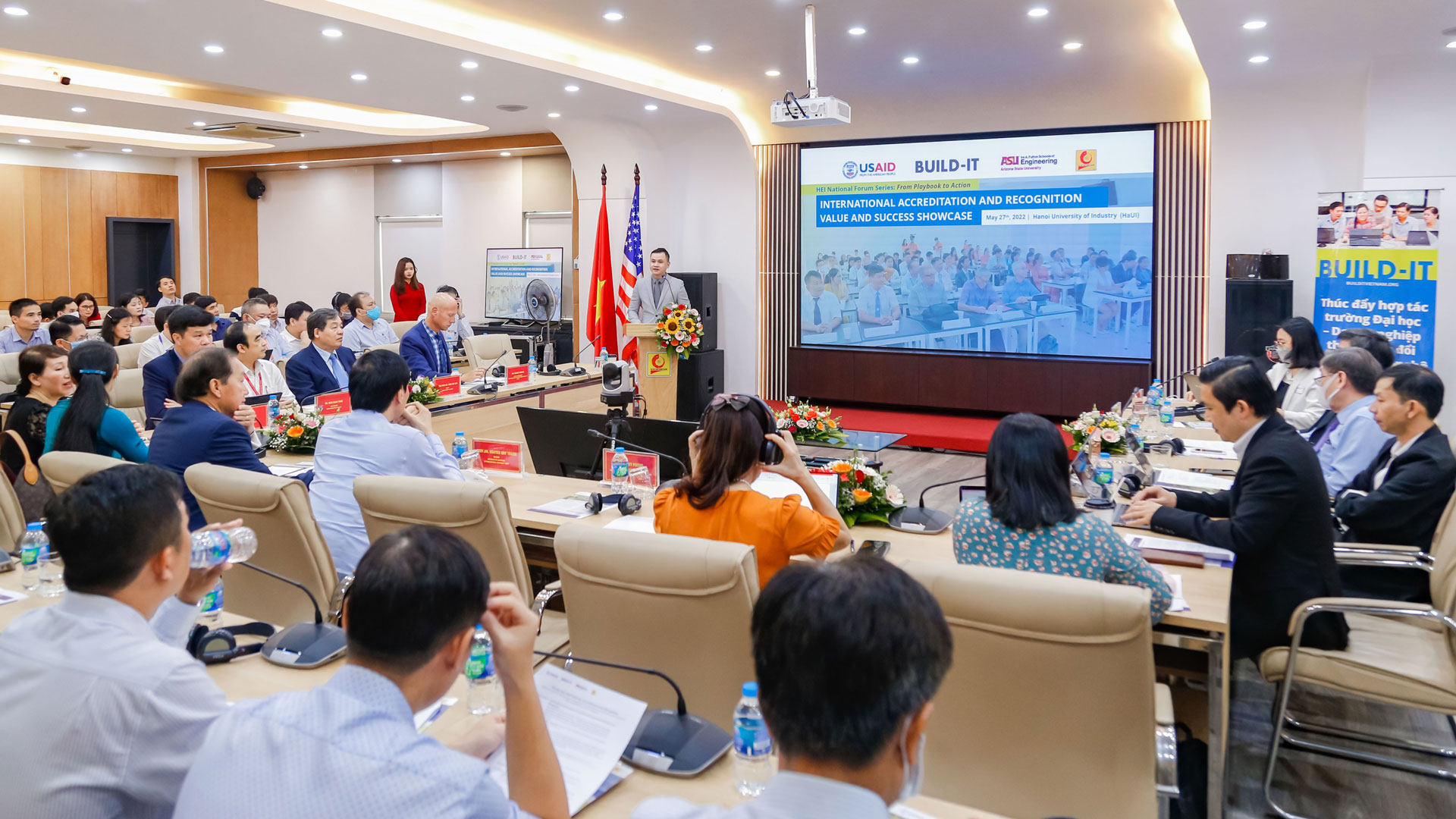
Representatives from BUILD-IT discuss accreditation success stories in a forum at Hanoi University of Industry. Efforts by BUILD-IT have helped change the perspective of the Vietnamese government, as well as university faculty and leadership, to value ABET accreditation and make it a priority in the country’s higher education system. Photo courtesy of BUILD-IT
Just as U.S. university practices have evolved from passive lecture halls to active learning models and industry engagement, Vietnamese universities are going through a similar transformation to elevate their higher education system.
This shift in perspective is occurring after years of partnerships between ASU and Vietnamese universities and government agencies that began in 2010.
“When we first started working in Vietnam, there was some hesitancy about the international accreditation process; it was new and different to put your programs out there for scrutiny,” Wigal says. “But the programs were ready to build quality and the leadership and faculty were ultimately up to the challenge.”
Change came in several stages. Before BUILD-IT, ASU worked on faculty development programs to improve the quality of engineering courses at Vietnamese universities, and then implemented a leadership institute to get university leaders on board with systemic educational changes. Now, ASU’s work with its partners in Vietnam has been a catalyst to help the Vietnam Ministry of Education and Training see the importance of accreditation.
“ASU has been integral in creating a bridge to get Vietnamese universities to look at these global opportunities and global standards,” Wigal says, “which has turned into a national goal of the Vietnamese Ministry of Education and Training to have globally recognized accreditation including ABET.”
Facilitating accreditation through connections
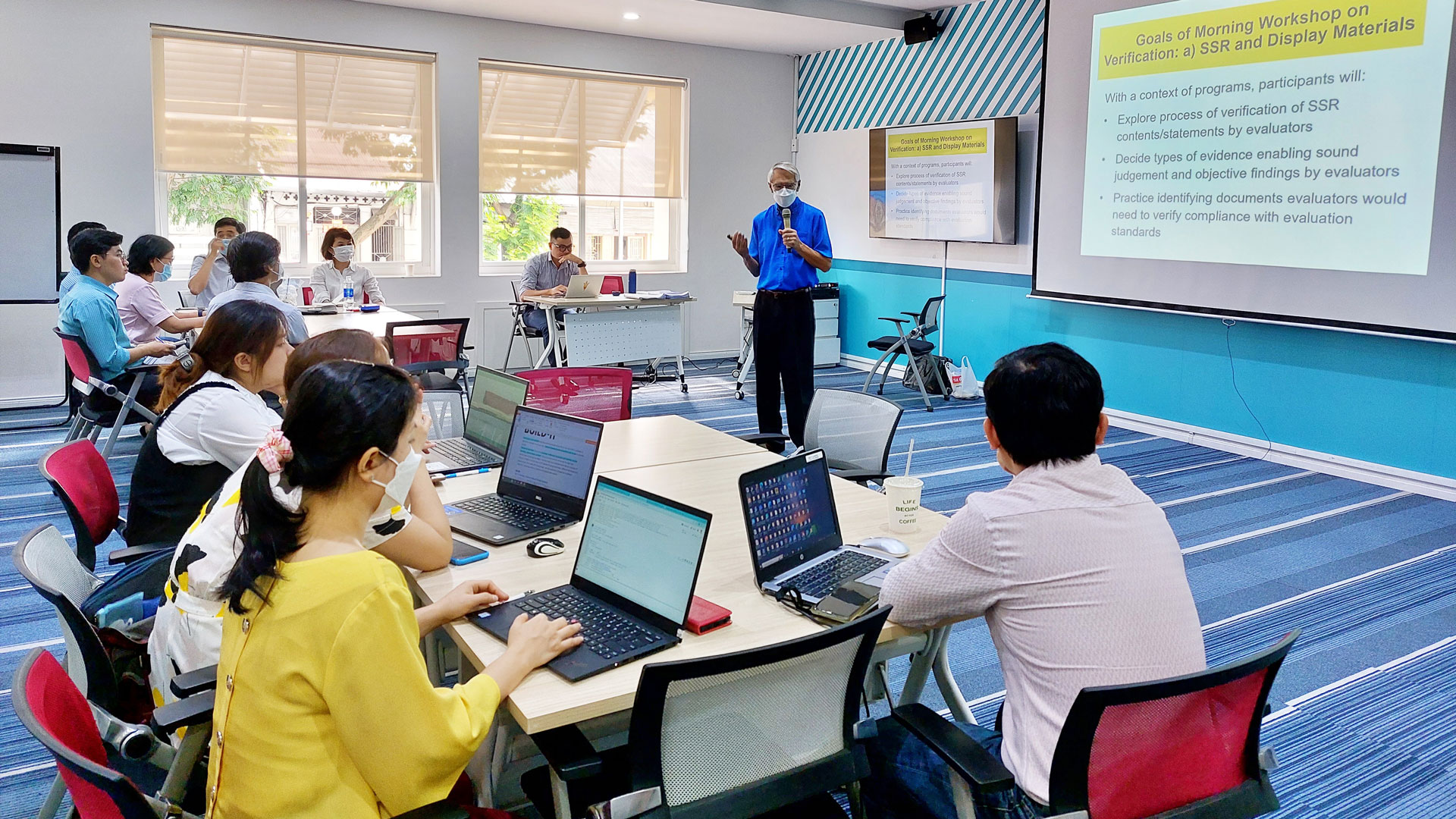
Scott Danielson, an associate professor of engineering programs in the Fulton Schools, leads a workshop at the ASU Representative Office in Vietnam. Danielson is an experienced ABET evaluator, and has helped universities in Vietnam through training in program assessment by conducting workshops on quality improvement and coordinating practice visits that generate valuable feedback to prepare for official evaluations. Photo courtesy of BUILD-IT
BUILD-IT has helped universities like IUH by providing workshops and coaching, and bringing in international experts from ASU as well as other institutions and industry.
Capacity-building workshops support improvements to align programs with ABET accreditation criteria, with coaching tailored specifically to each university’s programs. Workshop facilitators also help gather data for analysis to see whether programs have sufficiently prepared for ABET evaluation and provide feedback for areas of improvement.
While IUH and other universities have had consultants work with them on aspects of accreditation before, the Fulton Schools GOEE team went a step further to conduct practice visits that mimic what real ABET representatives will do in an actual evaluation.
“We’ve used our network to bring international experts in developing industry connections and industrial advisory boards, and with experience evaluating ABET programs to do accreditation practice visits so they can learn,” Wigal says. “That’s something they haven’t gotten outside of working with GOEE and BUILD-IT.”
Many of these network connections have been made by Scott Danielson, an associate professor of engineering programs in the Fulton Schools who also has experience working with ABET.
Danielson has conducted 12 ABET program evaluations and served as a team chair for 17 evaluations in which he oversaw a team assessing multiple programs at a university. His evaluation activities span the U.S. and Puerto Rico, as well as universities in Kuwait, Mongolia, Peru and the United Arab Emirates. He continues to participate in evaluations, and he is scheduled to conduct one in Mexico in the fall.
This year, Danielson was awarded Fellow status by ABET for “outstanding sustained leadership and service to ABET, its experts and accredited programs to advance the quality of engineering education both domestically and globally, especially in South East Asia.” His work with ABET has also contributed to being awarded Fellow status with the American Society of Mechanical Engineers in 2020, and earning the James H. McGraw Award from the American Society for Engineering Education this year.
He says ABET accreditation can be more difficult for international universities as they have different educational norms and practices but must meet the same criteria as U.S. schools — and write lengthy reports called self-studies in English.
“Having experienced ABET evaluators review draft program self-studies and provide feedback on common tripping points is critical to a successful initial ABET accreditation effort,” Danielson says. “The institutions and programs have to do the work of preparation and be willing to act upon the feedback provided via the self-study reviews and mock visits.”
For universities in Vietnam, the fact that programs are evaluated by a peer in the field who knows the discipline — and whether the faculty’s capabilities, course content and lab equipment are suitable — is different than any other local accreditation system they’ve participated in. However, as part of the BUILD-IT program, IUH had the support it needed to succeed.
“The BUILD-IT goal was to help programs achieve a ‘clean’ review — no shortcomings of any kind. IUH attained this goal for virtually all the programs evaluated, significantly exceeding IUH’s hopes and expectations,” Danielson says. “It was an outstanding result and I am confident it would not have happened without the interactions with the consultants provided by BUILD-IT. It has been a lot of work for everyone involved and it is always very satisfying to see such a great result.”
The Fulton Schools GOEE team has also brought in industry partners to work directly with universities to improve the quality of education. Industry was a catalyst for the need to improve university STEM programs in the region to elevate the quality of graduates entering the workforce.
ABET recognizes the importance of industry involvement in education through requiring an industry advisory board that helps develop a curriculum that stays up to date with modern practices, tools, equipment, teaching methods and skills.
ASU has helped facilitate partnerships with companies such as Autodesk, Amazon Web Services, Intel, Wiley, Microsoft, Oracle, Pearson, Rockwell Automation, eSilicon (which is now part of Marvell), First Solar and Dow to provide funding, lab equipment, curriculum guidance and mentorship to Vietnamese university programs.
“The GOEE team has played a huge role in setting up those connections with industry that build quality programs, set them up for accreditation and set them up for global success,” Wigal says.
Sustaining excellence in the region’s education
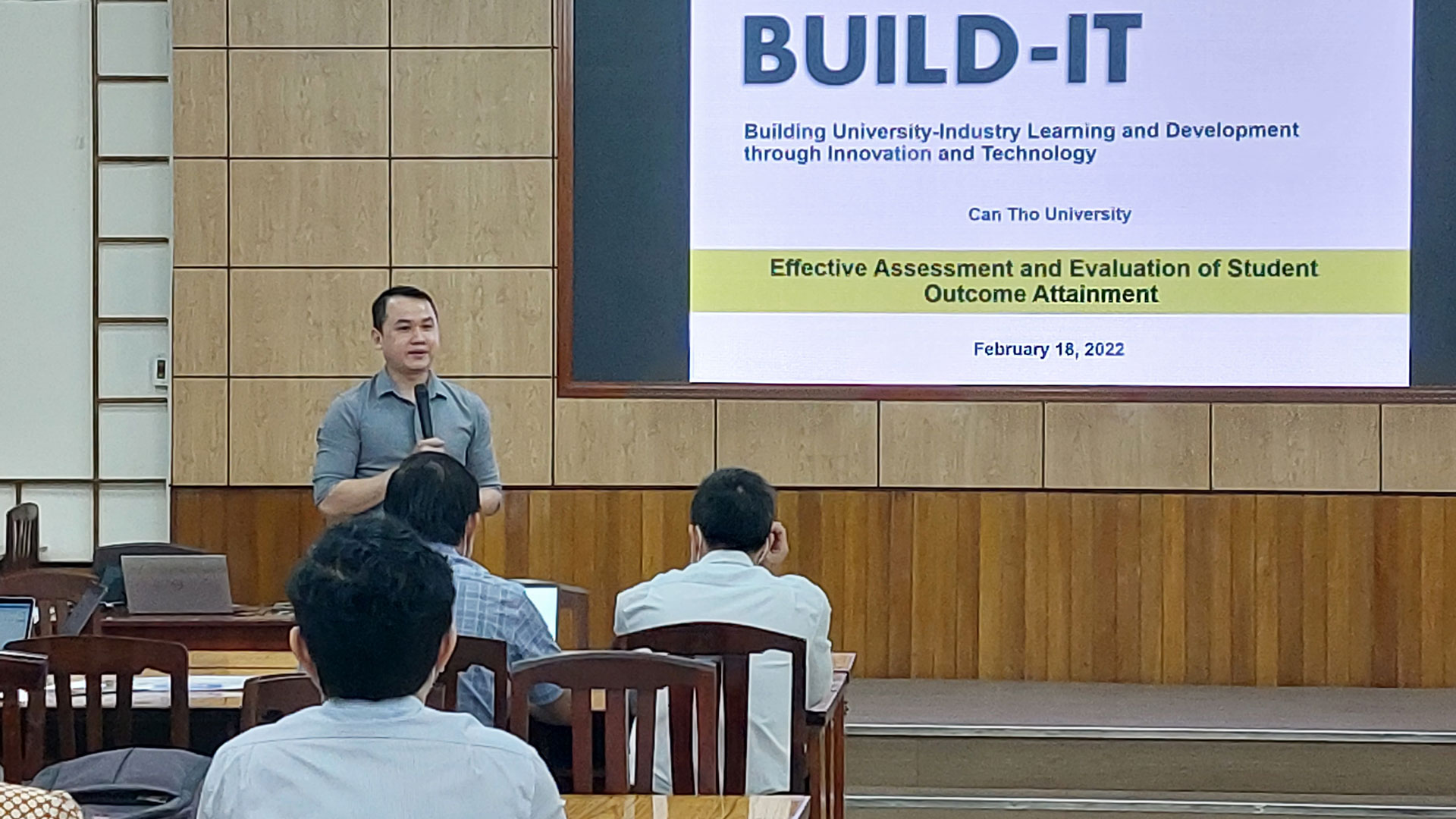
Thai Tran, a program manager for accreditation and quality assurance, presents a workshop on ABET accreditation topics at Can Tho University in Vietnam. Tran is one of the local facilitators trained by the Fulton Schools GOEE team to promote sustainable educational improvements for ABET accreditation in the region. Photo courtesy of BUILD-IT
ABET accreditation is not a one-time process — the organization periodically reviews programs for renewal to ensure they are maintaining quality. Engineering and technology programs can quickly become outdated in such a quickly evolving field, so programs like BUILD-IT that foster a culture of continual improvement are important for Vietnamese universities to retain accreditation in the future.
However, BUILD-IT is a limited-time program in the region, so the Fulton Schools GOEE team has trained local workshop facilitators to continue training new universities so they can bring their programs up to ABET standards for accreditation.
Thai Tran began working with the GOEE team on-site in Vietnam as an accreditation and quality assurance specialist in May 2018. Prior to joining the team, Tran knew little about institutional strategy, objective management, accreditation or assessment. However, having worked at a center governed by the Vietnam Ministry of Education and Training, he already shared the ambition of transforming higher education in Vietnam.
“Without major reform, the higher education institution sector isn’t equipped to support socio-economic advancement long term,” Tran says. “I strongly believe that we are helping higher education institution leaders and faculty members to deploy agile, responsive institutional leadership, policies and competencies to meet market needs, promote innovation and foster inclusion through embedding a quality improvement approach.”
Over his first three years with the GOEE team, he transitioned from observing workshops presented by Wigal and Danielson to co-facilitating workshops with them. After becoming a program manager in May 2021, Tran began facilitating accreditation workshops for quality assurance assessors, executive and academic leaders, faculty members and quality assurance professionals. Through these workshops, he is supporting the evolution of Vietnamese higher education institutions with new tools, institutional and program-level improvement processes, and effective and efficient methods of assessment and evaluation.
“These tools and techniques for accreditation and assessment have become part of the institutional process and contribute to the sustainability of quality education in the long term, increasing the breadth of programs seeking and achieving international accreditation and recognition,” Tran says.
Tran has done his part to help equip local accreditation assessors and quality assurance professionals with best practices they can share with others to continue the cycle of higher education improvements. He is now ready to train new workshop facilitators just as Wigal and Danielson trained him.
Exposure to a different style of leadership through his Fulton Schools team, including their clear goals, focus on continuous improvement and collaborative teamwork, has helped build Tran’s confidence and motivation to change the status quo to improve higher education in his country. Wigal has noticed his growth and impact.
“Thai has been a valuable resource and has learned and grown so much in leadership since he first joined the GOEE team,” Wigal says. “He has earned the esteem and respect of the best STEM universities in Vietnam.”



































